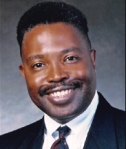By Christopher Metzler
 Let’s face it, if Barack Obama were not president of the United States, Michael Steele would not be the “chairman” of the Republican Party. Yet Steele continues to act as if race was not the sole reason that he was selected to lead The Grim Old Party. The reality is that both race and tokenism played a significant part in his election whether he and the GOP want to admit it or not. Moreover, while he continues to chastise others for “playing the race card,” he has given himself a Black pass to do so. It is, the curious case of the pot calling the kettle black.
Let’s face it, if Barack Obama were not president of the United States, Michael Steele would not be the “chairman” of the Republican Party. Yet Steele continues to act as if race was not the sole reason that he was selected to lead The Grim Old Party. The reality is that both race and tokenism played a significant part in his election whether he and the GOP want to admit it or not. Moreover, while he continues to chastise others for “playing the race card,” he has given himself a Black pass to do so. It is, the curious case of the pot calling the kettle black.
According to Steele, “Playing the race card shows that Democrats are willing to deal from the bottom of the deck. Our political system has no place for this type of rhetoric.”
However, “Mr. Chairman,” since you have been elected, your most significant accomplishments have included: having to apologize to Rush Limbaugh (the real head of the party), for calling him an entertainer. As you said in your apology, “My intent was not to go after Rush – I have enormous respect for Rush Limbaugh.” And, ” I was maybe a little bit inarticulate. … There was no attempt on my part to diminish his voice or his leadership.” Yet when New Gingrich dismissed Rush, he did not apologize. Does the phrase ‘yessa massa’ ring a historical bell?
In an interview with Cameron Cowan of milehive.com you promised to lure more Blacks to the Republican Party by offering fried chicken and potato salad. Perhaps you would have been more successful had you also offered Kool Aid, greens, watermelon and chitterlings. Does the phrase “jump Jim Crow” ring a bell?
Implying that President Obama is a racist for asking New York Gov. Paterson to end his bid for re-election. According to your racial logic, “Mr. Chairman,” implying the race card and playing the race card are two different things. As you said recently in an op-ed in Politico, “As an African-American, I know what racism is and that is not racism. Addressing the comments by President [Jimmy] Carter who said racism is to blame in the protests against President Obama, you said, “Just like the millions of African-Americans in this country who have fought and overcome on their way to the American dream, I have experienced racism firsthand. It is something you never forget.”
So, is the race card only the race card when you deem it to be “Mr. Chairman?”
Speaking at a historically Black college near downtown Little Rock, Ark., you said, “The Republican Party walked away from the black community in the late 1960s. It was stupid. It was dumb to pursue a southern strategy and it came back to bite them in 1992.” You went on to say, the Republican Party must court Blacks if they are to regain power. Have you vetted this with your party? The hallmark of your tenure has been making statements ostensibly on the part of your party and then having to backtrack. We thus anxiously await your forthcoming apology.
In fact, it seems that your base has rejected your fried-chicken-and-potato-salad strategy.
In response to your “outreach” several members of the Free Republic (online message boards for independent, grass-roots conservatism on the web) have written:
“Yeah, if the GOP would just offer MORE social welfare, we could get the black vote?”, “Single moms, drugs, easy credit, alcohol, disregard of the law, no education, no incentive, dependency upon the State”;
“This guy is just begging to be pelted with Oreos again. …I just wish he would focus on the REAL causes.1. What does the black community need: tough marriage laws, reduced welfare, educational vouchers, and good understanding of Booker T. Washington’s ‘Up from slavery.’ 2. Homelessness is caused by alcohol and drug addiction, and mental health disorders. Giving money to an alcoholic is the same as yelling jump to someone standing on the side of the Golden Gate Bridge. More welfare is NOT the answer.”
Of course, these statements, which are just a small sampling of what’s been written, are not at all about race because, as you have said, “Blind charges of racism, where none exist, not only are an affront to those who have suffered the effects of racism, but it weakens our efforts to address true acts of racism and makes them more difficult to overcome.”
So, are the statements by the Freepers as they call themselves true acts of racism or simply policy disagreements infected with the stench of stereotypes? Perhaps viewing these statements as acts of racism would be to raise charges of racism where none exist.
Your stance on racism, “Mr. Chairman,” can be described as contradictory, condescending racial polemics steeped in racial perturbation. You have said, “What you will face is very subtle. It’s very quiet. It’s deceiving, but it’s there and you can’t be fooled otherwise, but I’m still a black man; when I walk in a room, you have attitudes about black folks. I can’t change that. And I’ve gotta deal with that reality regardless of my title.”
Speaking of President Obama, you said, “He was not vetted, because the press fell in love with the black man running for the office. ‘Oh gee, wouldn’t it be neat to do that? Gee, wouldn’t it make all of our liberal guilt just go away? We can continue to ride around in our limousines and feel so lucky to live in an America with a black president.’”
So, “Mr. Chairman,” are you palling around with racists? Are you calling the kettle black? Or are you using the race card when it suits you. In the age of multitasking, critical thinkers will decide for themselves.
Dr. Christopher J. Metzler is the author of The Construction and Rearticulation of Race in a ‘post-racial’ America and an associate dean at Georgetown University’s School of Continuing Studies.

 Let’s face it, if Barack Obama were not president of the United States, Michael Steele would not be the “chairman” of the Republican Party. Yet Steele continues to act as if race was not the sole reason that he was selected to lead The Grim Old Party. The reality is that both race and tokenism played a significant part in his election whether he and the GOP want to admit it or not. Moreover, while he continues to chastise others for “playing the race card,” he has given himself a Black pass to do so. It is, the curious case of the pot calling the kettle black.
Let’s face it, if Barack Obama were not president of the United States, Michael Steele would not be the “chairman” of the Republican Party. Yet Steele continues to act as if race was not the sole reason that he was selected to lead The Grim Old Party. The reality is that both race and tokenism played a significant part in his election whether he and the GOP want to admit it or not. Moreover, while he continues to chastise others for “playing the race card,” he has given himself a Black pass to do so. It is, the curious case of the pot calling the kettle black. Dr. Christopher J. Metzler
Dr. Christopher J. Metzler
 Ronald Reagan
Ronald Reagan  If you want to have a good debate or scare people away, then start talking about race. The ‘race’ word is a powerful one in America’s lexicon and seems to bring out passionate feelings in us. It is a catalyst for both change and status quo. It is my thinking that the word race has brought into context words such as diversity, multiculturalism and inclusion, just to name a few. Many in this country would say that we are simply hung up on race. However, I think our racial healing, or hemorrhaging, is generational. Finally, it seems, young people are not as race-conscious as previous generations, although some may disagree with this statement. What makes the color of a person’s skin the object of so much attention and speculation? Why do some of us base our perceptions about a person solely on their skin color? As we all know, a person’s ability is not based on their skin color but on their competence and cognition. Yet, unfortunately, there are those who will go to their grave thinking otherwise. The uneasiness about race is felt on both sides. Many of our positions and mores about race come from our own experiences. Some of these feelings about race cannot be altered or changed regardless of how many diversity training programs we attend.
If you want to have a good debate or scare people away, then start talking about race. The ‘race’ word is a powerful one in America’s lexicon and seems to bring out passionate feelings in us. It is a catalyst for both change and status quo. It is my thinking that the word race has brought into context words such as diversity, multiculturalism and inclusion, just to name a few. Many in this country would say that we are simply hung up on race. However, I think our racial healing, or hemorrhaging, is generational. Finally, it seems, young people are not as race-conscious as previous generations, although some may disagree with this statement. What makes the color of a person’s skin the object of so much attention and speculation? Why do some of us base our perceptions about a person solely on their skin color? As we all know, a person’s ability is not based on their skin color but on their competence and cognition. Yet, unfortunately, there are those who will go to their grave thinking otherwise. The uneasiness about race is felt on both sides. Many of our positions and mores about race come from our own experiences. Some of these feelings about race cannot be altered or changed regardless of how many diversity training programs we attend.